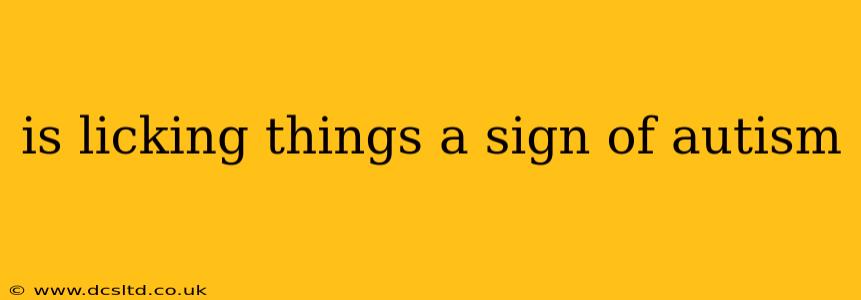Is Licking Things a Sign of Autism? Understanding Sensory Sensitivities and Repetitive Behaviors
Licking objects isn't automatically a sign of autism, but it can be associated with certain sensory sensitivities and repetitive behaviors sometimes seen in autistic individuals. It's crucial to understand that autism is a complex neurodevelopmental condition with a wide range of presentations. What might appear as a unique behavior in one person could be entirely different in another. Therefore, diagnosing autism based on a single behavior like licking is inaccurate and misleading.
Let's explore some related questions to better understand the connection:
What are sensory sensitivities in autism?
Many autistic individuals experience sensory sensitivities, meaning their senses – sight, sound, touch, taste, and smell – process information differently. This can lead to either oversensitivity (feeling overwhelmed by stimuli) or undersensitivity (seeking out intense sensory input). Licking objects might be a way for an autistic individual to seek specific sensory input, perhaps a particular texture or taste that provides a calming or self-regulating effect. It could be a way to manage sensory overload or understimulation.
Are repetitive behaviors common in autism?
Yes, repetitive behaviors, also known as stereotypies, are a common characteristic of autism. These behaviors can include hand flapping, rocking, lining up objects, or, as in this case, licking objects. These repetitive actions can serve as a self-soothing mechanism, helping to reduce anxiety or regulate emotions. However, repetitive behaviors are not exclusive to autism and can be present in individuals without autism spectrum disorder (ASD).
Could licking objects be a sign of something other than autism?
Absolutely. Several conditions can involve unusual sensory seeking or repetitive behaviors, including obsessive-compulsive disorder (OCD), attention-deficit/hyperactivity disorder (ADHD), and other developmental delays. Certain medical conditions can also contribute to unusual sensory behaviors. It's vital to rule out other potential causes before connecting licking to autism.
How can I tell if my child's licking behavior is related to autism?
A single behavior like licking objects is insufficient to diagnose autism. If you're concerned about your child's development, it's essential to consult a qualified professional, such as a pediatrician, developmental pediatrician, or psychologist. They will conduct a thorough assessment, considering a range of behaviors and developmental milestones, to reach an accurate diagnosis. This evaluation will likely involve interviews, observations, and possibly standardized tests.
What should I do if I'm concerned about my child's behavior?
Don't hesitate to seek professional help if you have concerns about your child's development. Early intervention is crucial. A thorough assessment will not only help determine if autism is a contributing factor but will also provide appropriate support and strategies to address any challenges. This might include occupational therapy to help manage sensory sensitivities, behavioral therapy to address repetitive behaviors, or other interventions tailored to your child's individual needs.
In summary: While licking objects can sometimes be associated with sensory sensitivities and repetitive behaviors seen in some autistic individuals, it's not a definitive sign of autism. A comprehensive evaluation by a qualified professional is crucial for accurate diagnosis and appropriate support. Focusing on understanding the underlying sensory needs and emotional regulation is key, regardless of the diagnosis.
